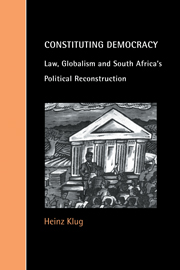Book contents
- Frontmatter
- Contents
- Acknowledgements
- Abbreviations
- Introduction
- 1 Post–Twentieth-Century Constitutionalism?
- 2 Legal Legacies and Constitutional Paths
- 3 Constitutionalism in Global Perspective
- 4 Constitutional Strategies
- 5 Constitutionalism in the Democratic Transition
- 6 Global Impact: International Imperatives and their Hybridization
- 7 The Constitutional Court and the Institutional Dynamics of Constitutionalism
- 8 Constitutional Imaginations and the Possibilities of Justice
- Conclusion
- Notes
- Bibliography
- Index
7 - The Constitutional Court and the Institutional Dynamics of Constitutionalism
Published online by Cambridge University Press: 06 July 2010
- Frontmatter
- Contents
- Acknowledgements
- Abbreviations
- Introduction
- 1 Post–Twentieth-Century Constitutionalism?
- 2 Legal Legacies and Constitutional Paths
- 3 Constitutionalism in Global Perspective
- 4 Constitutional Strategies
- 5 Constitutionalism in the Democratic Transition
- 6 Global Impact: International Imperatives and their Hybridization
- 7 The Constitutional Court and the Institutional Dynamics of Constitutionalism
- 8 Constitutional Imaginations and the Possibilities of Justice
- Conclusion
- Notes
- Bibliography
- Index
Summary
Introducing a supreme Constitution has fundamentally changed the place of the judiciary in South Africa's constitutional and political order. Analysis of the judicial role, and the Constitutional Court in particular, has in consequence focused on developing an understanding of how the Court will go about its task of applying and interpreting the Constitution, and the Bill of Rights in particular. This approach relies, it has been argued, upon comparative constitutionalism to trace the history of ‘ideological and jurisprudential struggle on the part of the judiciary to develop a coherent set of constitutional values which emanate clearly from a Bill of Rights and which can act as reliable signposts en route to a decision’. While this approach may be central to understanding the practice of advocates before the courts and indeed for identifying the relevant issues to which the Court will look in formulating its opinions in particular cases, I will argue that this approach provides only a part of the answer to the ‘mighty problem’ of judicial review.
Focusing on constitutional interpretation, and the explication of particular constitutional rights by courts in different parts of the world, fails to question how courts achieve the power, often in direct contradiction to a legislative majority or a popularly elected executive, to decide on issues of fundamental social importance. The doctrinal response is, of course, to point to the sections of the Constitution which explicitly grant the Court the power of judicial review, or failing which, to refer to case law in which the power was assumed.
- Type
- Chapter
- Information
- Constituting DemocracyLaw, Globalism and South Africa's Political Reconstruction, pp. 139 - 159Publisher: Cambridge University PressPrint publication year: 2000

